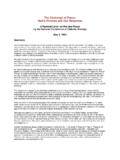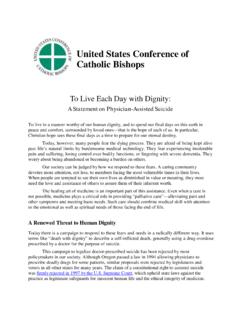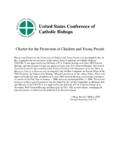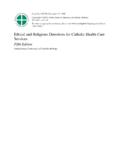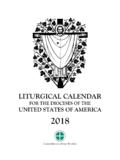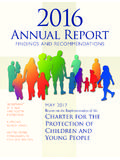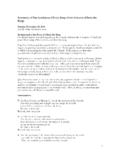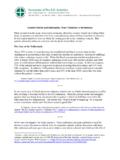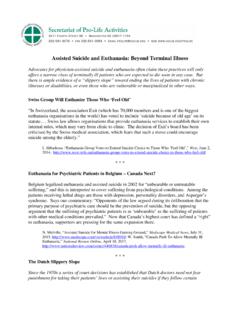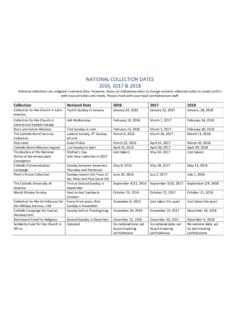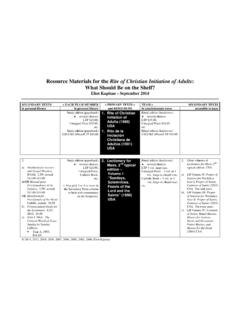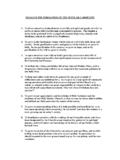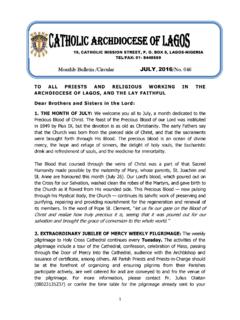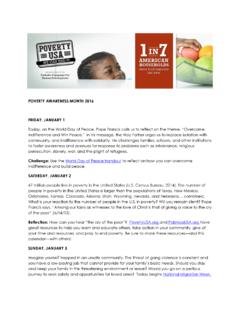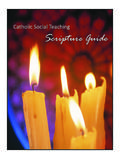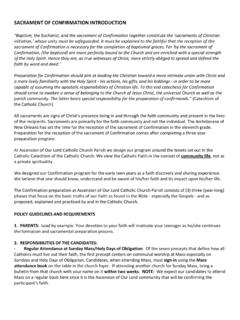Transcription of REPORT OF THE ROMAN CATHOLIC AND REFORMED …
1 1 THIS BREAD OF LIFE REPORT OF THE UNITED STATES ROMAN CATHOLIC - REFORMED DIALOGUE ON THE EUCHARIST/LORD S SUPPER (November, 2010) CONTENTS Section 1: General Introduction 2 1a: Scope of This Dialogue on the Eucharist/Lord s Supper 3 1b: Brief History and Development of the Sacrament 4 1c: Design of This REPORT 10 Section 2: Perspectives on Five Themes for Eucharist/Lord s Supper 11 2a: A REFORMED Perspective on the Five Themes 11 2b: A ROMAN CATHOLIC Perspective on the Five Themes 42 Section 3: Convergences and Divergences 57 3a: Epiclesis Action of the Holy Spirit 58 3b: Anamnesis Remembering 60 3c: Presence of Christ 63 3d: O ffering and Sacrifice 68 3e: Discipleship 70 Section 4: Pastoral Implications 73 Appendix: ROMAN CATHOLIC and REFORMED Liturgies for Eucharist/Lord s Supper 79 2 Section 1.
2 General Introduction In the groundbreaking ecumenical document, Baptism, Eucharist and Ministry (1982), the Faith and Order Commission of the World Council of Churches declared as its aim to proclaim the oneness of the Church of Jesus Christ and to call the churches to the goal of visible unity in one faith and one eucharistic fellowship, expressed in worship and common life in Christ, in or-der that the world might believe. 1 Similarly, the ROMAN CATHOLIC Church, in the Vatican Coun-cil document Sacrosanctum Concilium (The Constitution on the Sacred Liturgy, December 4, 1963) listed as two of its aims to encourage whatever can promote the union of all who believe in Christ; [and] to strengthen whatever serves to call all of humanity into the church s fold.
3 2 In pursuit of these noble goals, we offer this REPORT from the seventh round of dialogue between the United States Conference of CATHOLIC Bishops and four denominations in the REFORMED tradition: the Christian REFORMED Church in North America (CRC), the Presbyterian Church, (PC(USA)), the REFORMED Church in America (RCA), and the United Church of Christ (UCC). This round of dialogue began with a discussion of the sacrament of baptism (2003-2007), which resulted in the REPORT , These Living Waters: Common Agreement on Mutual Recognition of Baptism. 3 The present document concludes this round of ecumenical discussion with its re-port on the second part of the dialogue (2007-2010), which focused on what is commonly called the Eucharist in the ROMAN CATHOLIC tradition and the Lord s Supper or Holy Communion in the REFORMED tradition.
4 We hope that this REPORT is read by and benefits church leaders, pastors, ministers, seminarians, and parishioners. We offer the REPORT with the prayer that it will serve to draw our communions closer to lived unity within the Body of Christ. 1a: Scope of the Dialogue on Eucharist/Lord s Supper As we affirmed in our earlier REPORT on baptism, Baptism is the sacramental gateway into the Christian life, directed toward the fullness of faith and discipleship in Christ. 4 Together we un-derstand that the sacrament of the Lord s Supper/Eucharist nourishes believers to live their bap-tismal identity and commitment throughout their lives.
5 1 Baptism, Eucharist and Ministry, Faith and Order Paper, no. 111 (Geneva: World Council of Churches, 1982), viii. 2 No. 1 in Vatican Council II: Constitutions, Decrees, Declarations (Northport, NY: Costello, 1996), 117. 3 These Living Waters: Common Agreement on Mutual Recognition of Baptism ( REPORT prepared during the sev-enth round of the United States CATHOLIC - REFORMED dialogue, 2008). 4 These Living Waters, 5. 3 At the outset of our dialogue on the Eucharist/Lord s Supper, we agreed that we would broad-en our discussion to include key themes beyond those commonly considered. Many previous ecumenical discussions of the Eucharist/Lord s Supper have focused on the issues of the real presence of Christ in the sacrament and on sacrifice and offering, since these have tended to be areas of greatest divergence.
6 While we realize that the presence of Christ and sacrifice/offering are critical themes needing our attention (and, indeed, they will be thoroughly discussed), we came to understand that there is a richness to be uncovered by broadening our dialogue to include epiclesis (invoking the ac-tion of the Holy Spirit), anamnesis (the act of remembering), and discipleship (the response-action of believers).5 Furthermore, as we developed all five themes, we discovered that they are not isolated but closely interconnected. Taken together, these themes offer a rich approach to the sacrament that points to a felicitous degree of ecumenical convergence.
7 It is our hope that this REPORT fairly represents each dialogue partner s understanding of the Eucharist/Lord s Supper, and clearly states both points of agreement and those needing further dialogue. We recognize that there are other critical issues ( , ecclesiology, orders, actual di-vergence in practice) related to the sacrament. However, time and the mandate given to us by our respective churches have led us to limit our focus to these five themes. It is our prayerful expec-tation that future dialogue will be able to address these other significant issues. 1b: Brief History and Development of the Sacrament There is much documentation concerning the development of the ritual shape of the Eucha-rist/Lord s Supper across the centuries.
8 This development shows increased understanding through ritual experience of and theological reflection on the meaning of the sacrament. It is not our intent to present this development in detail here. However, we believe it will be helpful to outline in broad strokes the development of the sacrament, for this not only points to a common early tradition we all share, but it also provides the basis on which we have structured the body of this REPORT . 5 Significant scholarly work in recent decades by both Protestants and ROMAN Catholics has led to a new appreciation of the work of the Spirit in the Eucharist (especially with respect to the epiclesis) and to a richer understanding of the role of remembering (anamnesis) in Jewish and early Christian praying.
9 These developments have led to liturgi-cal changes in all of our communions and prompted the decision to incorporate these two themes so prominently in this REPORT . 4 Earliest Practice Both scriptural and extra-scriptural evidence suggests that the earliest celebrations of the Lord s Supper/Eucharist were simple family gatherings of about thirty to fifty people held in the larger homes of wealthier community members who were able to accommodate these num-bers. In response to Jesus command to do this in remembrance of me (Luke 22:19), this shared meal ended with the blessing, breaking, and giving of bread and the blessing and passing of the cup (1 Corinthians 11:20-22).
10 On the one hand, this meal was a continuation of the table fellowship so central to Jesus whole ministry, and, on the other hand, in some of the Gospels it was unmistakably linked to the Jewish Passover celebration. In addition to the significance of the meal as a response to Christ s command to celebrate in a remembrance of him, these gatherings were also significant because all present were to be re-garded as equals, regardless of their economic or social rank. Social distinctions were abolished through baptism into Christ, and thus could have no place at the communion meal. Hence Paul was dismayed at the behavior of the Corinthian community, where some had their fill while oth-ers were shamed and went The late first-century Didache7 indicates that the Christian community gathered on the Lord s Day (14:1), and this gathering included confession of sins (4:14; 14:1), reconciliation with neighbors (14:2), and making memorial of the Lord s From this early, simple descrip-tion of the Supper as a memorial of the Lord s sacrifice celebrated in the context of a household meal, sacramental theology and practice developed.
